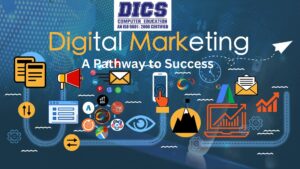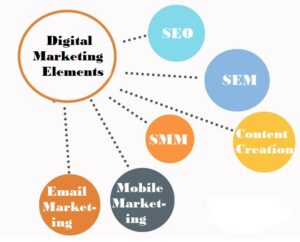Digital marketing encompasses all marketing efforts that utilize an electronic device or the internet. Businesses leverage digital channels such as search engines, social media, email, and websites to connect with current and prospective customers. It’s a dynamic field, constantly evolving with new technologies and trends. Unlike traditional marketing, which relies on print, radio, and television, digital marketing offers a more targeted and measurable approach.
It takes many forms, including:
- Search engines
- Websites
- Social media
- Mobile apps
- Text messaging
- Web-based advertising
Digital marketing uses the same principles as traditional offline marketing. It relies on consumer data to find a business’s target audience and deliver the most relevant messaging possible.
Your company’s use of digital marketing depends on its model. Business-to-business (B2B) companies sell to other businesses, which requires a longer, more strategic approach. Business-to-consumer (B2C) companies sell directly to everyday customers, which requires shorter sales cycles and a larger audience.
The difference between B2B and B2C digital marketing:
- B2B decisions involve multiple people, while B2C typically only involves a single person.
- B2B clients tend to have a longer decision-making process, so digital marketing should focus on building relationships.
- The B2C buying process is generally shorter, so this requires short-term, urgent messaging.
- B2B transactions are more driven by logic, while B2C is driven more by emotion.
Fortunately, digital marketing works for both approaches. Whether you’re targeting businesses or consumers, digital marketing will help you streamline the marketing process for results.
Why is Digital Marketing Important ?
In today’s digital age, the majority of consumers research products and services online before making a purchase. This makes digital marketing crucial for businesses of all sizes. Here’s why it matters:
- Wider Reach: Connect with a global audience, transcending geographical limitations.
- Targeted Advertising: Reach specific demographics and interests, maximizing ad spend efficiency.
- Measurable Results: Track campaign performance in real-time, allowing for data-driven optimization.
- Cost-Effective: Often more affordable than traditional marketing methods, especially for small businesses.
- Personalized Experiences: Deliver tailored content and offers, enhancing customer engagement and loyalty.
- Improved ROI: Increased brand awareness, website traffic, lead generation, and ultimately, sales.
- Improved ROI: Increased brand awareness, website traffic, lead generation, and ultimately, sales.
Key Components of Digital Marketing
Search Engine Optimization (SEO):
This involves optimizing website content and structure to rank higher in search engine results pages (SERPs) for relevant keyword, increasing organic traffic to your website.
Content Marketing:
Creating and distributing valuable, relevant, and consistent content ( e.g., blog posts, videos, infographics ) to attract and engage a target audience, ultimately driving them to take desired actions.
Social Media Marketing:
Utilizing social media platforms to connect with potential customers, built brand awareness share content, and drive traffic to your website.
Email Marketing:
Reaching out to customers and prospects directly through email campaigns, nurturing leads, promoting products/services, and fostering customer loyalty.
Search Engine Marketing:
.SEM is a form of digital marketing that utilizes paid advertising to boost a website’s presence in search engine results. It involves using paid search campaigns to display ads on search engine results pages, typically triggered by specific keywords related to the products or services being offered.
Mobile Marketing:
Mobile marketing is any advertising activity that promotes products and services via mobile devices, such as tablets and smartphones. It makes use of features of modern mobile technology, including location services, to tailor marketing campaigns based on an individual’s location.
Benefits of Digital Marketing for Business:
Implementing a well-defined digital marketing strategy can provide numerous benefits for businesses:
- Increased Brand Awareness: Digital channels allow you to reach a wider audience and build brand recognition.
- Higher Conversion Rates: Targeted campaigns and personalized experiences can lead to higher conversion rates.
- Improved Customer Loyalty: Engaging with your audience on social media and providing excellent customer service can foster customer loyalty.
- Better ROI: Digital marketing offers a more measurable and cost-effective approach compared to traditional marketing.
- Competitive Advantage: A strong online presence can help you stand out from competitors and attract new customers.
- Data-Driven Insights: Digital marketing provides valuable data and insights that can inform your overall business strategy.
Challenges in digital marketing:
While digital marketing offers numerous benefits, it also comes with its own hurdles you need to navigate. Don’t let unforeseen challenges trip you up — try to be aware of the following:
- Changing algorithms. Platforms like Google and social media frequently update their algorithms, which can affect your SEO, paid campaigns, and visibility.
- Data privacy and compliance. With regulations like GDPR and CCPA, businesses must carefully handle customer data to stay compliant.
- Competition. Digital marketing has a low entry barrier, making it easy for competitors to flood channels and reduce visibility.
- Measuring ROI. While digital marketing offers analytics, tying specific campaigns to ROI can still be challenging, particularly for long-term strategies.
- Customer trust. With so much content available, gaining trust can be difficult. Brands need to deliver value and consistency to stand out.
By understanding these challenges, businesses can adapt their strategies and overcome obstacles with proactive solutions.